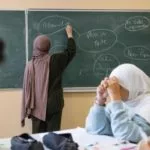
(PARIS) — Opened 20 years ago and voted best high school in France in 2013, with baccalaureate success rates between 97% and 100% each year, the Averroès school group in Lille, which is also the largest private Muslim secondary school in France, is threatened with closure.
An advisory commission chaired by Georges-François Leclerc, prefect of the Hauts-de-France region, voted on Nov. 27 for the termination of the financing contract linking the high school branch of Averroès to the state since 2008, leaving 473 high-school and 352 middle-school students, as well as 110 employees, uncertain about their future.
Several prominent voices have denounced the commission, with president of the school’s parents’ association, Mohamed Daoudi, arguing it was “grotesque,” as the prefect was both “judge and jury.”
In a surprise turn of events over the weekend, the prefect validated the decision, making the termination of the school’s state contract official without prior formal notice to the school. The end of the contract would be the first time a private school loses its agreement with the state.
The case gained more visibility in recent days, but the issues raised by the authorities aren’t new.
Qatar Papers, a book by French journalists Georges Malbrunot and Christian Chesnot, raised concerns to the Hauts-de-France regional council in 2019. Xavier Bertrand, who presided at the time, said on X on Monday that the decision “is a major step in the Republican offensive against the proponents of political Islam.”
The book claimed $3.2 million, or about 3 millions euros, in funding had been given to the school by the nongovernmental organization Qatar Charity. It also detailed relationships the association administering the school has, especially with Muslims of France, a religious association with alleged ties to the Muslim Brotherhood, and also to Qatar.
In the years since, Bertrand has suspended the annual regional subsidy due to the school. A decision the school has challenged and won before the court.
In its June 2023 report, France’s supreme audit institution qualified Qatar Charity as the association’s “main foreign financier” from 2011 to 2015. The funding amounted to about $1 million that was “intended to finance the development of the association’s activity in general, as well as the purchase and fitting out of additional premises, carried out in 2016.”
Since then, there have been no traces of further foreign donations, the report said. The financial authority pointed to “a brutal and continuous deterioration” which has put the institution in “a very critical financial situation.”
Averroès needs about 2 million euros each year to continue functioning, including about 1.7 million euros from the state. Between 50% and 60% of the school’s scholarship holders are from low income families.
A 12-page document from the prefect and dated Oct. 27 supported the proposed termination of the contract, highlighting “funding sources which raise questions,” in reference to the Qatar Charity grant, whose “real amount” remains “nebulous” to him.
He also pointed to a book, which students studied in an optional Muslim ethics course, as being “in complete contradiction with republican values.”
The institution has denied claims about its funding and courses.
The book in question, which “was never made available to students” and is “not even with us,” has “comments [which] pose a problem,” but “we never mention the comments,” Averroès headmaster Eric Dufour told ABC News, as they are “contrary to our values.”
“Nobody, neither the students, nor the parents, nor the educational team recognize themselves in everything that is said about the high school,” Dufour said.
He said he was confident “our case and our arguments are solid” and will prevail in appeal. That sentiment was echoed by the members of the school’s parents’ association and the alumni association.
Mohamed Daoudi and his vice president, Lailla Mouzoun, told ABC News the parents are fully behind the school, but they are worried about what this decision will entail for their children come September 2024.
Recently, the situation has taken a toll on everyone and led the school to request a psychological cell with support staff, including psychiatrists, for its students and staff.
Far from alone, the school has gained the support of more than 31,000 people thanks to an online petition. It’s backed by local and national figures, including the nonprofit Human Rights League.
For Jean-René Lecerf, a former senator and ex-president of the departmental council of the north, “the legal case [against the school] seems extremely, extremely weak” and “contentious annulment” is unescapable. He said he fears however that both schools will shut down waiting for resolution, as “contentious annulment takes time.”
Sciences Po school director in Lille, Pierre Mathiot, said he labeled the decision “unfair and disproportionate.” Socialist deputy Roger Vicot said he fears the closure of the school would feed “the feeling of rejection and exclusion of the Muslim community.”
For La France Insoumise deputy Paul Vannier, the school is the subject of a “clearly discriminatory treatment,” being one of only two Muslim high schools in the country.
The office of Interior Minister Gérald Darmanin declined to comment, but a source close to the minister told ABC News he supports the action of the prefect, whom he’s known for years.
The Education Minister’s office did not respond to a request for comment.
Copyright © 2023, ABC Audio. All rights reserved.
